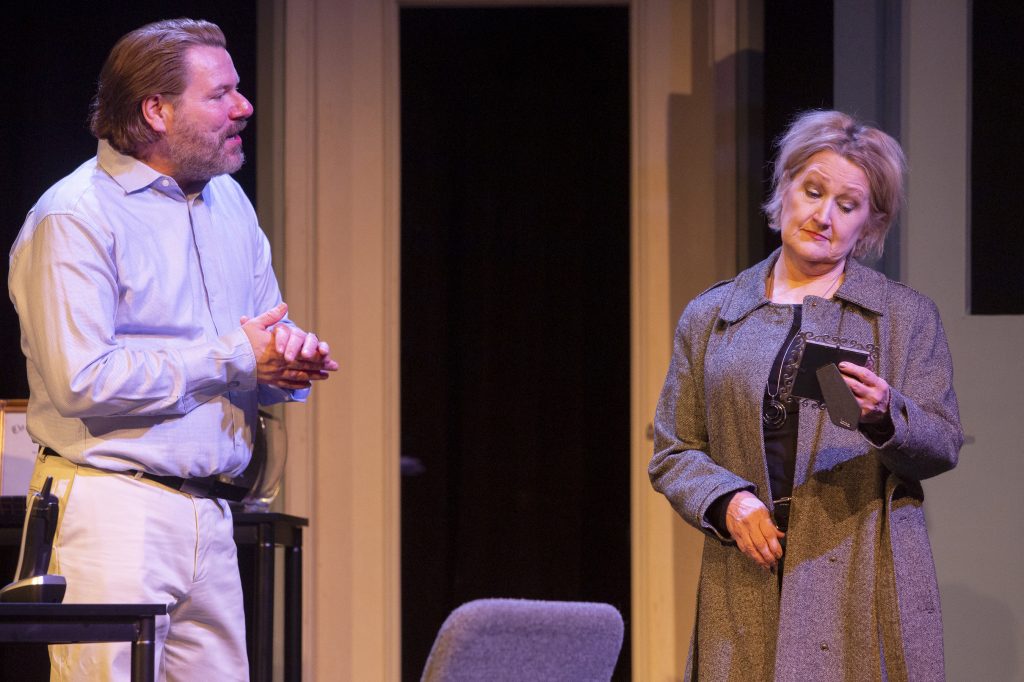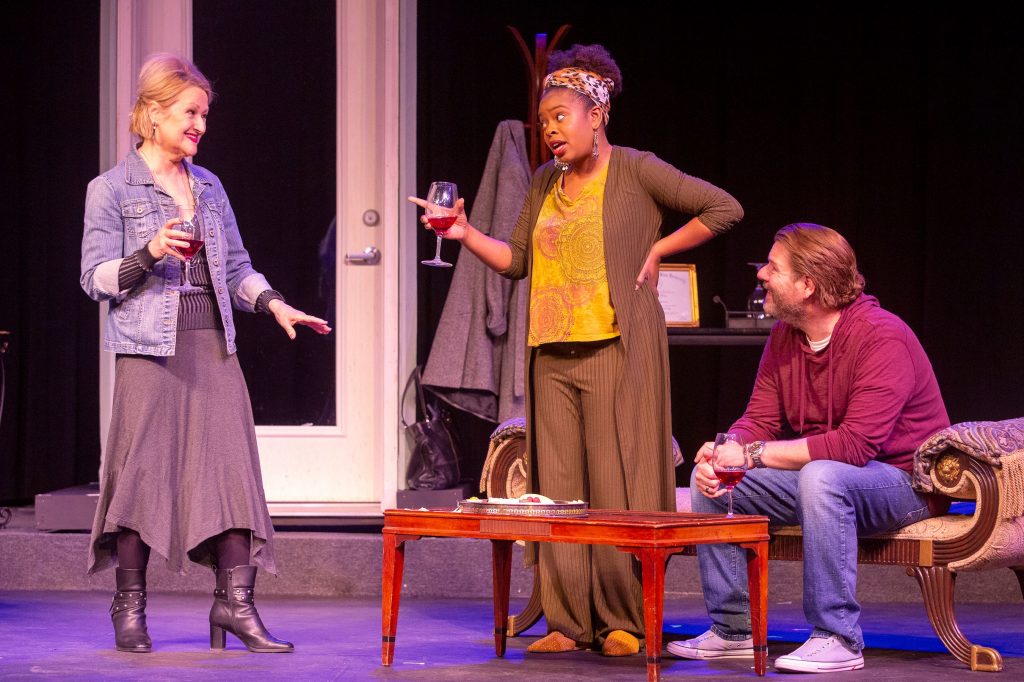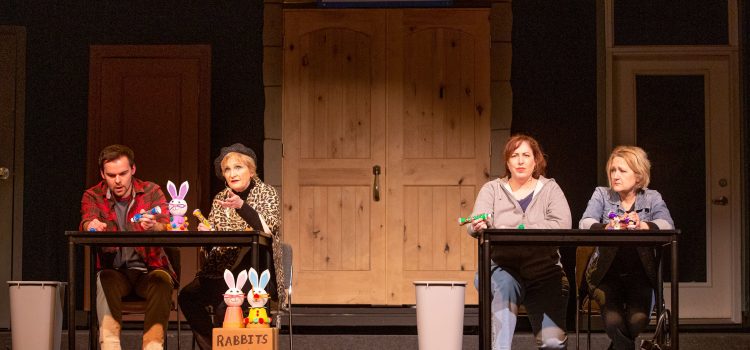By Lynn Venhaus
Our turfs and our tribes. It’s what defines us.
Well, we like to think that, but maybe it’s our choices that shape us. David Lindsay-Abaire’s “Good People,” a brilliant examination of class, good fortune, and the struggles of those left behind, is getting a stimulating treatment at Stray Dog Theatre.
Talk about a conversation starter! With a superb cast led by the incomparable Lavonne Byers, the gritty “Good People” bluntly spells out the wide divide between the haves and have-nots, and not just financially, but in word, thoughts, and deeds.
Margie Walsh is a Southie, for she lives in South Boston’s Lower End, a primarily working-class Irish American neighborhood where the playwright grew up. So, he wrote with deep understanding and connection.
Byers conveys Margie’s toughness and anxiety, with an undercurrent of desperation that she tries not to show. Her weapon is sarcasm. Hardened by a hardscrabble life, she has fought, clawed, and scratched in a dog-eat-dog world. Stubborn and proud, sometimes she has made life more difficult for herself because she will not rely on anyone, but she is loyal to a fault.
After high school, she became a caretaker. It’s a lifetime ago, and that’s when her dreams died, if she had any. As the single working mother of a developmentally disabled adult daughter, she plugs away at minimum-wage jobs. After being late too many times waiting for her daughter’s sitter to show up, she is fired from working as a cashier at the dollar store.
Friends and neighbors gather at the church hall for Bingo in hopes of winning the jackpot and to socialize. Stephanie Merritt is amusing as ballsy Jean, mouthy but well-meaning; Liz Mischel is defensive as the indifferent landlady Dottie, who is also Joyce’s unreliable sitter; and Stephen Henley projects a sweetness as the decent, practical Stevie, her compassionate ex-manager.
The Southie accent is a difficult one, so the dialect work is to be commended, because it’s evident that the ensemble worked on getting it right.

About to be evicted, Margie is hanging by a thread. She is not “lace curtain Irish.” Jean knows she needs a break and mentions that she ran into Margie’s old high school flame, Mike, now a doctor. Why doesn’t she ask him for a job, or his help in finding one?
“Mikey” is now a fertility specialist, and he lives with his elegant African American wife Kate and their daughter in Chestnut Hill, an affluent village six miles from downtown Boston. He doesn’t have any office openings. Caught off-guard by the visit 30 years after he last saw her, he prefers not to be reminded of his rough-and-tumble upbringing. She forces an invitation to his wife’s party. Maybe someone else can help with employment.
It’s cancelled, their daughter is sick, but Margie thinks he is blowing her off, and shows up anyway at the door, and Kate mistakes her for the caterer.
Stephen Peirick is Mike, now “Michael,” and Laurell Stevenson is Kate, who live comfortably, although see a couples’ therapist. Their nouveau riche lifestyle is worlds apart from his humble formative years in South Boston. Humble, he’s not.
There is more to the story, but it’s best the audience discover the developments on their own. Just know that pleasant social graces disappear when a confrontation gets ugly. Initial warmth gives way to a chilling coldness.
Under Gary F. Bell’s savvy direction, the trio nimbly escalates emotions that lead to a cruel climax. Peirick, not often playing a jerk, indicates “Michael” is increasingly uncomfortable to be confronted with his past with Margie’s presence.
With her customary confidence, Byers shows how Margie, while agitating, has more integrity in her pinkie finger than the arrogant Michael does. Although Kate is civil at first, and a liberal, she lives in a bubble. And who is ‘self-made’ here, anyway?
Bell heightens the tension while emphasizing “the sides,” and the actors maintain the on-edge feeling throughout the second act, especially in their body language.
At first unassuming but then richly textured, “Good People” is an outstanding production that accentuates that character matters. Your opinion may shift about who is ‘good people.’
Margie, with a hard “g,” clings to her dignity, hoping for a fresh new start, but realizing the dead end is likely where she will stay. She is at once hard to figure out but also completely recognizable.
Scenic designer Josh Smith’s economical set takes a back seat to the human drama unfolding, although there are certain props that are meaningful, such as googly-eyed bright pink bunnies that Dottie makes as her side hustle, and a very expensive vase in Dillon’s upscale home.
Justin Been’s sound design and Tyler Duenow’s lighting design are first-rate.
Lindsay-Abaire, who won a Pulitzer Prize for Drama in 2007 for “Rabbit Hole,” draws his characters well, especially women, for Frances McDormand won a Tony for Lead Actress as Margie in “Good People” in 2011 and Cynthia Nixon won as Becca in “Rabbit Hole.”
In the 11 years since the play was produced on Broadway, the gulf seems wider, and the play, which was excellently produced at The Repertory Theatre of St. Louis in January 2013, seems more pertinent than ever about struggles in hard times.
This is a cast that meets the challenge, and Stray Dog meets the moment in a tautly constructed drama of uncomfortable truths.

Stray Dog Theatre is presenting “Good People” Feb. 10-26 at 8 p.m. Thursday through Saturday and an additional 2 p.m. matinee on Sunday, Feb. 20, in the Tower Grove Abbey, 2336 Tennessee Avenue, St. Louis, Mo. 63104. For tickets or more information, visit. www.straydogtheatre.org
Special guidelines are in place for the health and safety of guests, actors and staff: Masks are required of all guests, regardless of vaccination status. They still encourage physical distancing throughout the theater. They recommend, but do not require, that all guests be vaccinated.

Lynn (Zipfel) Venhaus has had a continuous byline in St. Louis metro region publications since 1978. She writes features and news for Belleville News-Democrat and contributes to St. Louis magazine and other publications.
She is a Rotten Tomatoes-approved film critic, currently reviews films for Webster-Kirkwood Times and KTRS Radio, covers entertainment for PopLifeSTL.com and co-hosts podcast PopLifeSTL.com…Presents.
She is a member of Critics Choice Association, where she serves on the women’s and marketing committees; Alliance of Women Film Journalists; and on the board of the St. Louis Film Critics Association. She is a founding and board member of the St. Louis Theater Circle.
She is retired from teaching journalism/media as an adjunct college instructor.

